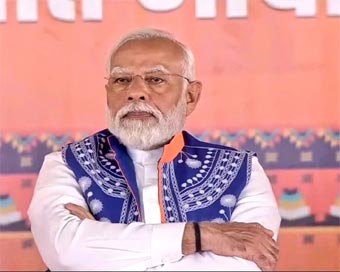 PM Modi visit USA
PM Modi visit USA Only the mirror in my washroom and phone gallery see the crazy me : Sara Khan
Only the mirror in my washroom and phone gallery see the crazy me : Sara Khan Karnataka rain fury: Photos of flooded streets, uprooted trees
Karnataka rain fury: Photos of flooded streets, uprooted trees Cannes 2022: Deepika Padukone stuns at the French Riviera in Sabyasachi outfit
Cannes 2022: Deepika Padukone stuns at the French Riviera in Sabyasachi outfit Ranbir Kapoor And Alia Bhatt's Wedding Pics - Sealed With A Kiss
Ranbir Kapoor And Alia Bhatt's Wedding Pics - Sealed With A Kiss Oscars 2022: Every Academy Award Winner
Oscars 2022: Every Academy Award Winner Shane Warne (1969-2022): Australian cricket legend's life in pictures
Shane Warne (1969-2022): Australian cricket legend's life in pictures Photos: What Russia's invasion of Ukraine looks like on the ground
Photos: What Russia's invasion of Ukraine looks like on the ground Lata Mangeshkar (1929-2022): A pictorial tribute to the 'Nightingale of India'
Lata Mangeshkar (1929-2022): A pictorial tribute to the 'Nightingale of India' PM Modi unveils 216-feet tall Statue of Equality in Hyderabad (PHOTOS)
PM Modi unveils 216-feet tall Statue of Equality in Hyderabad (PHOTOS)Hockey India has announced a 54-member core probable squad for the upcoming senior men’s
- Satwik-Chirag return as BAI names 14-strong squad for BWF Sudirman Cup Finals 2025
- Men’s Sr Hockey Nationals to be played in division-based format from April 4
- Mensik denies Djokovic 100th title in Miami final
- KIPG: Son of a vegetable vendor, Bihar’s Jhandu Kumar eyes Worlds, 2028 Paralympics
- Hardik Singh credits hard work and team unity for receiving HI Midfielder of the Year award
Govt working to boost research & innovation among youth: PM Modi on National Science Day Last Updated : 28 Feb 2024 01:32:42 PM IST 
Prime Minister Narendra Modi The government is working to boost research and innovation among youth, said Prime Minister Narendra Modi while conveying greetings on National Science Day on Wednesday.
National Science Day is celebrated every year on February 28 to commemorate the great Indian physicist C. V. Raman, who discovered the Raman Effect.
"Greetings on National Science Day. Our Government is continuously working to encourage research and innovation among the youth. This is important to realise our dream of a Viksit Bharat," PM Modi wrote in a post on X.
C V Raman had on February 28, 1928, discovered a phenomenon of the scattering of photons, which later came to be known as the 'Raman Effect' after his name.
The Raman Effect can be explained as a phenomenon where light meets particles smaller than its wavelength, and spreads in different directions.
This is because some of the incoming photons' energy can be transferred to a molecule, giving it a higher level of energy).
In 1930, the physicist also received a Nobel Prize for the remarkable discovery, and this was the first Nobel Prize for India in the field of science.
Union Minister of State for Electronics and IT, Rajeev Chandrasekhar, also in a post on X, extended greetings on National Science Day.
"Today, on #NationalScienceDay, we commemorate the legacy of Sir C.V. Raman and his groundbreaking discovery, #TheRamanEffect. This day serves as a reminder of our nation’s rich scientific heritage and our contributions to global research and innovation ecosystem," Rajeev wrote in the post.
"Inspiring future generations to pursue excellence in science and technology will pave the way for a brighter and more prosperous future," he added.
The theme this year is "indigenous technologies for Viksit Bharat".
"This year will not only mark a new era but also seek to present an opportunity for the public and scientific fraternity, both domestically and internationally, to collaborate, work together, and contribute to the well-being of India and humanity as a whole," said Jitendra Singh, MoS for Science & Technology.IANS New Delhi For Latest Updates Please-
Join us on
Follow us on








172.31.16.186







